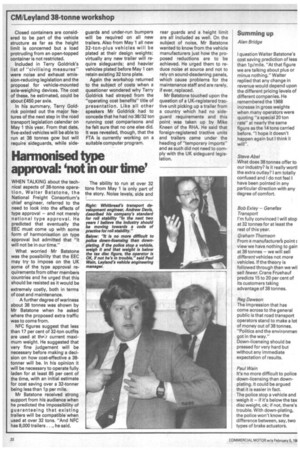Harmonised type approval: 'not in our time'
Page 24

If you've noticed an error in this article please click here to report it so we can fix it.
WHEN TALKING about the technical aspects of 38-tonne operation, Walter Batstone, the National Freight Consortium's chief engineer, referred to the need to look into the effects of type approval — and not merely national type approval. He predicted that eventually the EEC must come up with some form of harmonisation on type approval but admitted that "it will not be in our time."
What worried Mr Batstone was the possibility that the EEC may try to impose on the UK some of the type approval requirements from other members countries and he urged that this should be resisted as it would be extremely costly, both in terms of cost and maintenance.
A further degree of wariness about 38 tonnes was shown by Mr Batstone when he asked where the proposed extra traffic was to come from.
NFC figures suggest that less than 17 per cent of 32-ton outfits are used at the;r current maximum weight. He suggested that very fine judgement will be necessary before making a decision on how cost-effective a 38tonner will be. In his opinion it will be necessary to operate fully laden for at least 85 per cent of the time, with an initial estimate for cost saving over a 32-tonner being less than 1p per mile.
Mr Batstone received strong support from his audience when he predicted the impossibility of guaranteeing that existing trailers will be compatible when used at over 32 tons. "And NFC has 8,000 trailers . . he said. The ability to run at over 32 tons from May 1 is only part of the story. Noise levels, side and rear guards and a height limit are all included as well. On the subject of noise, Mr Batstone wanted to know from the vehicle manufacturers just how the proposed reductions are to be achieved. He urged them to reduce noise at source and not to rely on sound-deadening panels, which cause problems for the maintenance staff and are rarely, if ever, replaced.
Mr Batstone touched upon the question of a UK-registered tractive unit picking up a trailer from a country which had no sideguard requirements and this point was taken up by Mike Kneen of the RHA. He said that foreign-registered tractive units and trailers came under the heading of "temporary imports" and as such did not need to comply with the UK sideguard legislation.












































































































